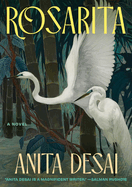
Lauded Anita Desai's return to publishing after a dozen-plus years will undoubtedly draw extra attention to her spare, sublime Rosarita, about an Indian woman studying Spanish in vibrant San Miguel de Allende. Desai writes intriguingly in second person to introduce her protagonist, Bonita, who sits on a park bench and realizes she's not alone: "Staring at you fixedly, taking in every detail of your person" is Vicky--although Bonita calls her "the Stranger"--who insists she knew Bonita's mother, the titular Rosarita. Ignoring Bonita's correction that her mother was named Sarita, Vicky reveals a "mythical mother" who arrived alone to study painting in Mexico. Bonita longs to believe, to dispel her own memories of a silenced and abused Sarita. Desai skillfully shifts to third person, as if suggesting a distanced truth, to resurrect Rosarita who, haunted by the legacy of India's Partition, becomes captivated by Mexican muralists and the Mexican Revolution, and temporarily escapes through art.
Desai provides no definitive revelations nor resolutions. The Stranger all but disappears, while Bonita's search feels unfinished. She imagines her mother "clutching her passport, her visa, her ticket, a bag, her fear and her nerve, doing what till the very last she had not believed she could do." Bonita considers her own autonomy: "Just as you had shed her... she now shed you. Go free." As in The Zigzag Way (2004), which was also set in Mexico, Desai's intricately sensory descriptions of landmarks and landscapes transform cities and villages into memorable characters. Despite the novel's brevity, Desai turns Bonita's journey into an immersive experience through indelible, exquisite storytelling. --Terry Hong

